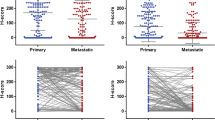Abstract
In a group of 74 patients with advanced metastatic breast cancer, 57% of those with cytoplasmic oestrogen receptor activity in their tumours (REC+) showed a clinical response to endocrine therapy. Of 51 patients whose tumour was assayed for both REC and cytoplasmic progesterone (RPC) activity, 9/12 patients with REC+ RPC+ tumours responded to hormone treatment, whereas only 3/30 patients with REC-RPC-tumours had a clinical response. In a group of 19 patients in whom nuclear oestrogen receptor (REN) was also estimated in the pellets from tumour-tissue homogenates, 5/6 with tumours positive for all 3 receptors showed a clinical response. None of the 9 patients with triply negative tumours responded. Addition of the REN assay appears to reinforce the greater precision of prediction when RPC as well as REC are estimated in breast tumours.
This is a preview of subscription content, access via your institution
Access options
Subscribe to this journal
Receive 24 print issues and online access
$259.00 per year
only $10.79 per issue
Buy this article
- Purchase on Springer Link
- Instant access to full article PDF
Prices may be subject to local taxes which are calculated during checkout
Similar content being viewed by others
Rights and permissions
About this article
Cite this article
Barnes, D., Skinner, L. & Ribeiro, G. Triple hormone-receptor assay: a more accurate predictive tool for the treatment of advanced breast cancer?. Br J Cancer 40, 862–865 (1979). https://doi.org/10.1038/bjc.1979.277
Issue Date:
DOI: https://doi.org/10.1038/bjc.1979.277
This article is cited by
-
Analysis of estrogen receptors in human breast cancer by assays using monoclonal antibodies and by the dextran-coated charcoal method
The Japanese Journal of Surgery (1987)
-
Significance of the tritiated thymidine labeling index in breast cancers
The Japanese Journal of Surgery (1985)
-
Cytosol and nuclear estrogen receptors (occupied and unoccupied sites) and progesterone receptors in human breast cancer
Breast Cancer Research and Treatment (1985)
-
The biology and physiology of ‘Nolvadex’ (tamoxifen) in the treatment of breast cancer
Breast Cancer Research and Treatment (1982)
-
Steroid hormone receptors and sex chromatin frequency in breast cancer
Journal of Endocrinological Investigation (1981)



